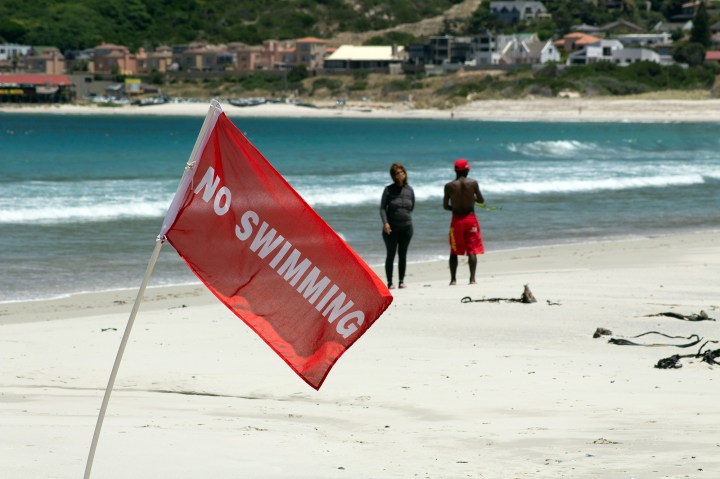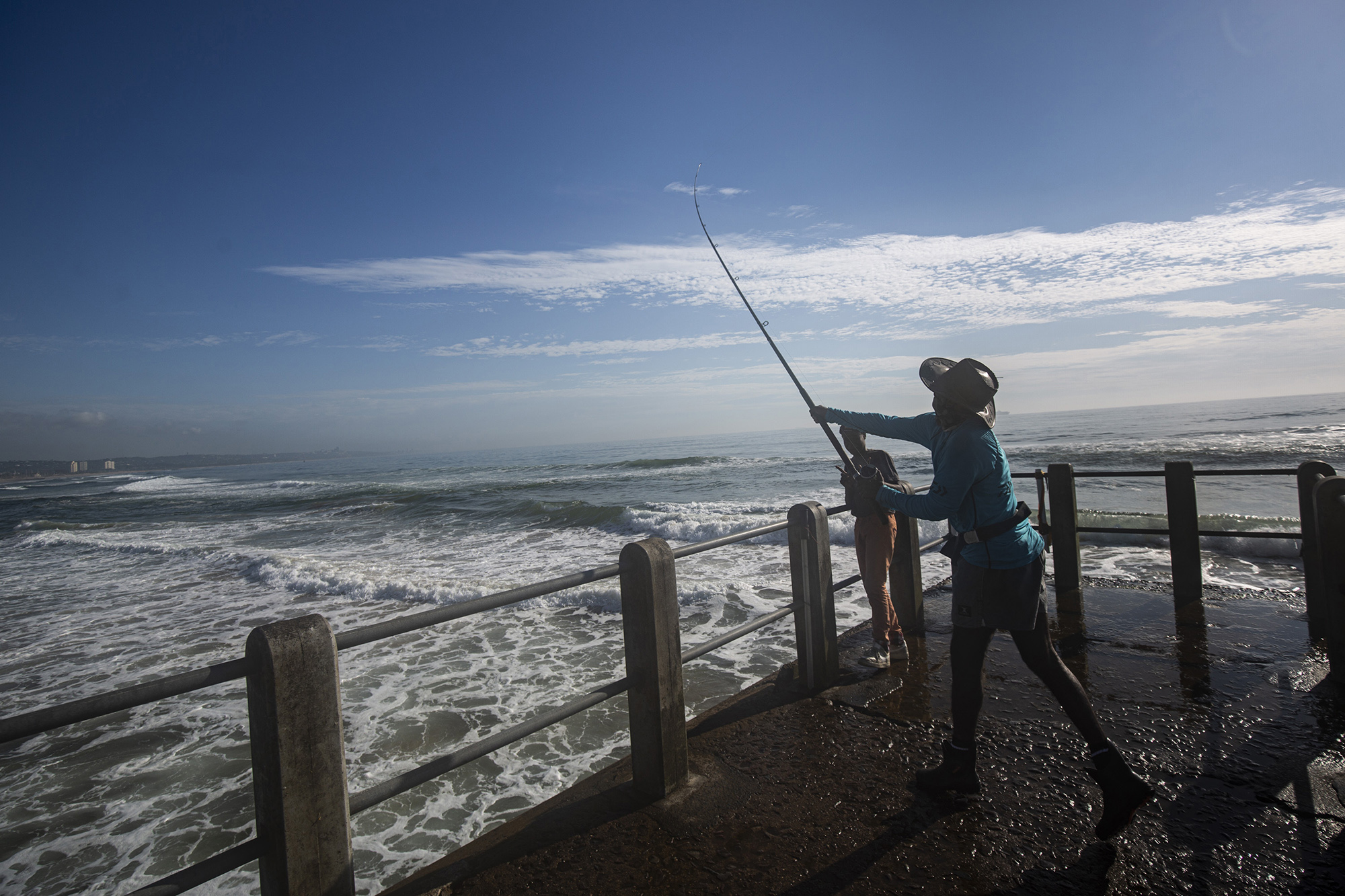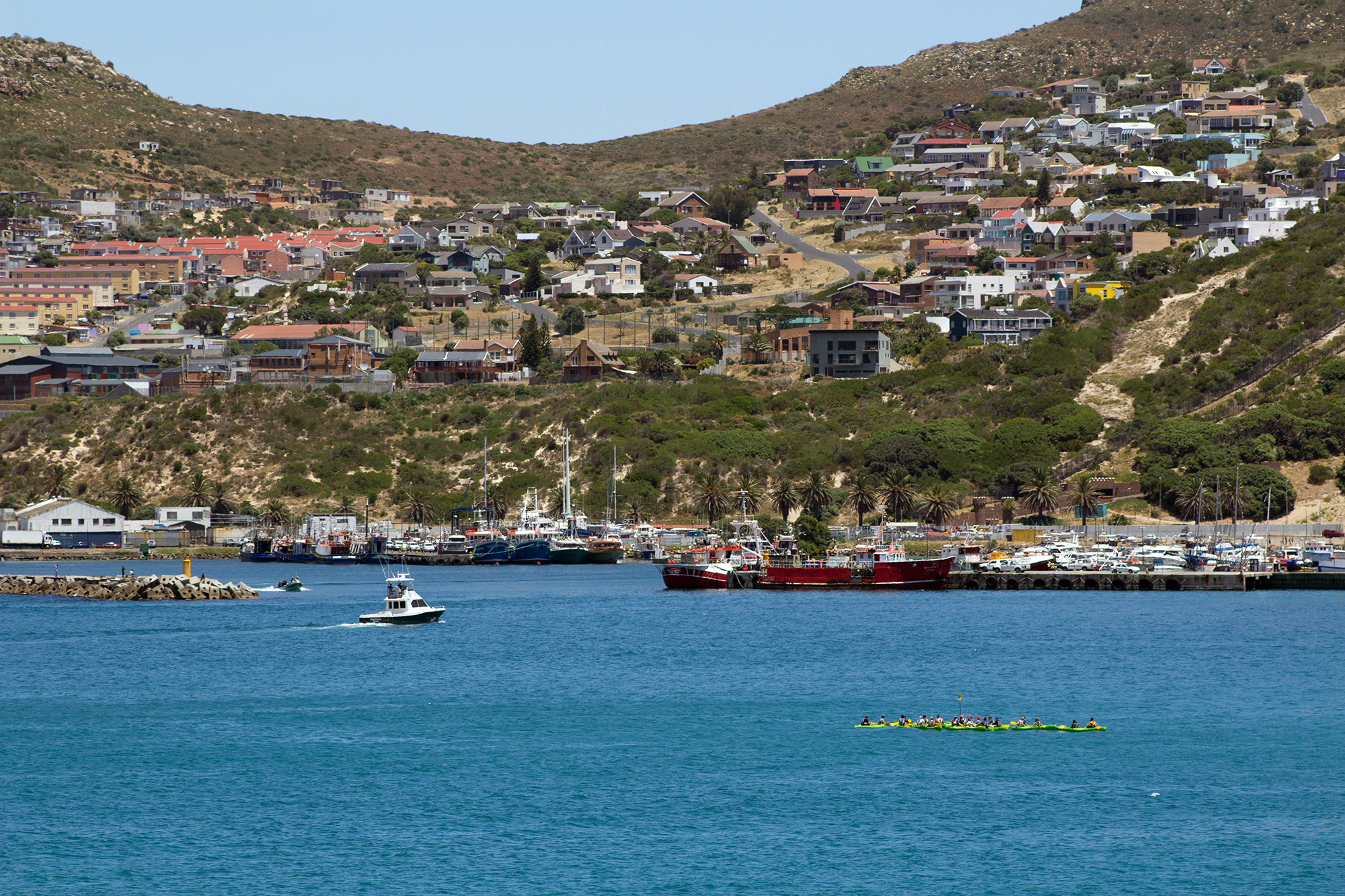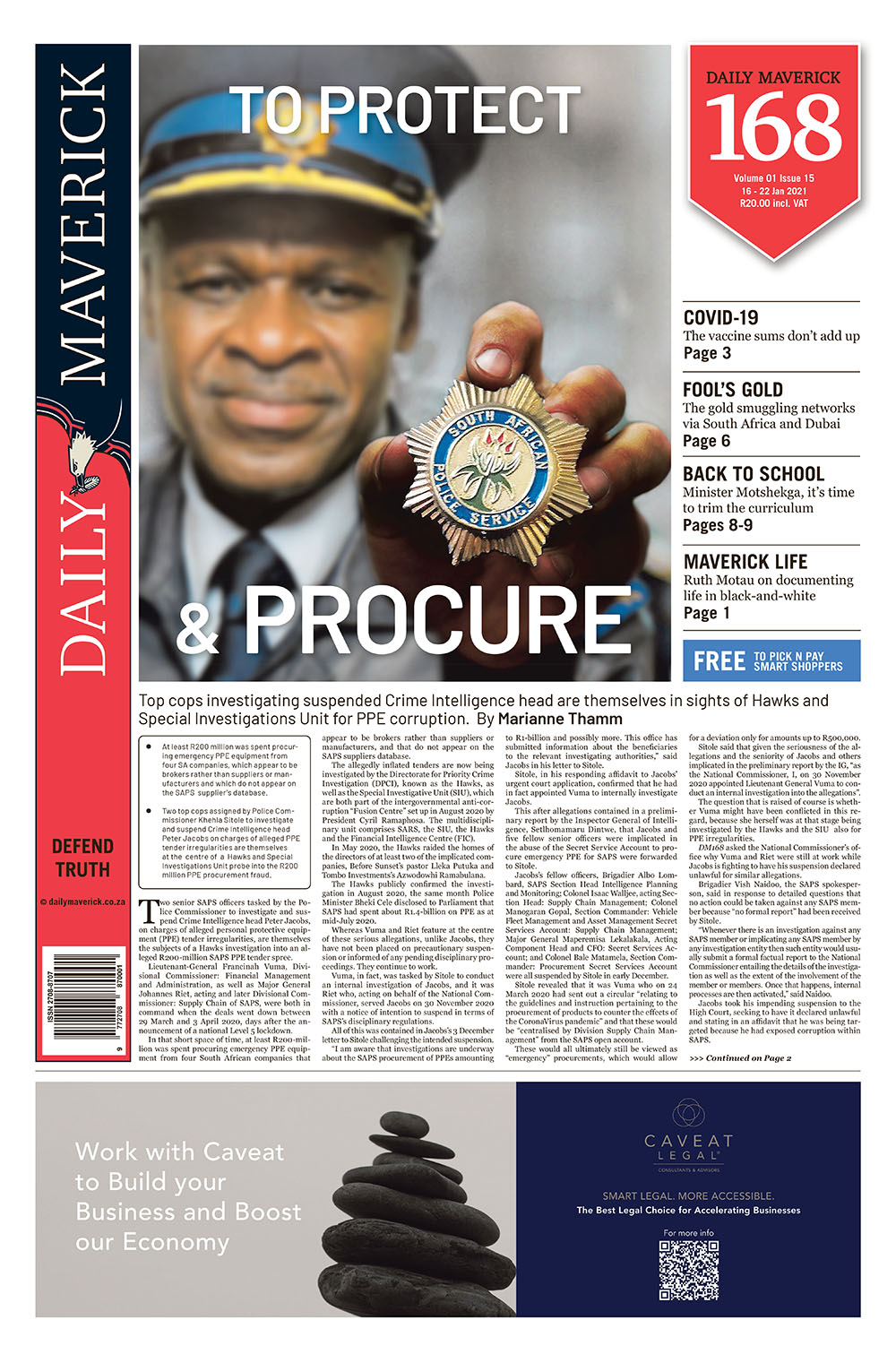MAVERICK CITIZEN 168
Life’s not a beach during Covid-19

There have been a few instances of people flouting the beach ban across most of the nation’s beaches, with several steep fines issued, according to the authorities.
First published in the Daily Maverick 168 weekly newspaper.
South Africa was 19 days into the beach and river ban for declared hotspot areas, as of 16 January. Beach towns are the epicentre of both the summer and the second wave of the Covid-19 pandemic.
The major beaches were quiet and all but deserted when Daily Maverick toured the Cape Peninsula on Wednesday. Even the waves of Muizenberg, Cape Town’s surf hub, were abandoned, leaving Muizies eerily still and the surf shops closed to surf lessons and board hire.
Craig Paul, co-owner of the iconic 45-year-old Lifestyle Surf Shop, said that the last time Muizenberg was “slightly” full was the day after President Cyril Ramaphosa announced the extended beach ban on 28 December, which included Muizenberg.
Since then, “there has not been a soul” in the waters of Muizenberg, he said.
The empty beaches were the same at the major spots, but around less accessible areas that are not easily monitored by the authorities, it is easier for surfers to sneak in a wave on beach and reef breaks that run along the coast, and for swimmers to take a dip in the water.
Muizenberg is one among all beaches across the country – except Northern Cape – that has been closed since 29 December, when the hot-spot ban was extended. Muizenberg joined an earlier beach ban implemented on 16 December, which included Eastern Cape and Garden Route beaches. On that day, it was also announced that KwaZulu-Natal beaches would be closed for public holidays during the festive season, as well as on 2-3 January.
While some die-hard beach and surf lovers have been taking chances at remote spots and at sunset or dawn outside regular police duty hours, others have been taking advantage of a loophole in the regulations that allows people with fishing rods and permits to still keep their feet sinking in the sand.
This could help explain the 67% increase in fishing licences. The South African Post Office issued 86,098 fishing licences nationally in December 2020, compared with 51,654 issued in December the previous year, according to the Post Office’s spokesperson, Johan Kruger. Most licences were sold in the Western Cape, Kruger said.
SANParks spokesperson Reynold Thakhuli said the increase in the number of fishing permits being sold had left local post offices without permit forms. Not all those with the permits were fishing.
“Many have bought permits to be able to be on the beach on estuary embankments,” Thakhuli said, adding that even guesthouse owners had admitted to buying extra fishing permits to issue these to guests so they could access beaches.
The National Coronavirus Command Council first implemented the ban to prevent large gatherings on beaches as Covid-19 cases increased in the Western Cape, the West Coast, Overberg, Winelands, the City of Cape Town and Central Karoo District Municipality, in addition to the Garden Route.
Under the revised Level 3 regulations, last amended on 11 January, it was stipulated that all beaches, dams, lakes and rivers would remain closed to the public in areas declared as hot spots.
But the rules surrounding the ban have been a little unclear, with social media and sport activity sites haggling over the initial definition of what constitutes a “beach” in a bid to find a loophole.

A spear fisherman walks along Ushaka Beach with his catch in Durban. Beaches are closed in an effort to curb coronavirus infections. (Photo: Rogan Ward)
Taking chances
The SAPS in the Eastern and Western Cape, two hot-spot provinces, noted general compliance with the ban, at least when they were monitoring the forbidden areas.
According to Brigadier Tembinkosi Kinana, the Eastern Cape had not recorded any violations of the ban.
Cape Town was experiencing ongoing issues with kite surfers – taking advantage of the Cape’s summer southeaster – in the Table View area, said Richard Bosman, the City of Cape Town’s executive director for safety and security.
There were people in the Western Cape taking chances, confirmed Brigadier Novela Potelwa, an SAPS spokesperson.
To date, a total of 15 individuals had been fined in the Overberg and removed from Pringle Bay, Onrus and Castle Bay since 29 December. They each paid R1,000 fines, Potelwa said.
Two surfers were arrested for surfing in Langebaan and subsequently paid a R2,500 fine each. And, on 12 January, two teenagers about to surf were warned and removed from Onrus beach in the Overberg.
Meanwhile on beaches along the Garden Route around Mossel Bay, George and Klein Brak, some bathers were also removed and warned by law enforcement officials, Potelwa said. There were isolated incidents of a few individuals on beaches in Cape Town.
According to Thakhuli, a few individuals pushed their luck at the Knysna estuary when no law enforcement officer was visible. This had also been the case higher up the Knysna River, Thakhuli said.
The KwaZulu-Natal SAPS were also asked to supply figures about compliance with the closures, but had not responded at the time of writing.

A fisherman casts on a pier on the Durban beach front. (Photo: Rogan Ward)
When is a beach a beach?
In the new regulations, gazetted by Co-operative Governance and Traditional Affairs Minister Nkosazana Dlamini Zuma on 11 January, the definition of a “beach” was included, potentially intended to provide clarity on what is covered by the ban on beaches in all areas declared as hot spots.
According to the gazette, a beach is defined as the “sandy, pebbly or rocky shore between the high-water mark and low-water mark adjacent to the sea or an estuary mouth extending 1,000 metres inland from the mouth; and within 100 metres of the high-water mark”.
However, the regulations exclude private property, and do not account for piers or walkways near a beach or estuary.

Only birds occupy Bay of Plenty beach on the Durban beach front. (Photo: Rogan Ward)
It’s time to stay at home
Just glancing at social media, it is clear many people are desperate to go back to the sea- shore and spend what is left of the summer surfing the waves and strolling the beaches.
According to Thakhuli, there had been instances of aggression against and verbal abuse of rangers when they applied the regulations. “Many tourism associations and members are placing pressure on SANParks and blaming SANParks for the bans while this is a government regulation and directive,” said Thakhuli.
There would be transmissions of the disease on packed beaches, said Lucille Blumberg, a deputy director at the National Institute of Communicable Diseases.
“Many people go and gather … you just need to look at Durban beaches on Christmas or New Year’s Day,” she said about the beaches, which thousands of people usually visited during this time.
“Just being outside does not mean there is no risk,” she said.
“It’s time to stay at home – as much as possible,” Blumberg added. If people strictly adhered to all the regulations, “it will certainly reduce transmission”.
Water enthusiasts have complained on social media about malls being packed while beaches were empty and were being patrolled by the police.
According to Blumberg, being in a full mall, at close quarters, poses some risks. But passing someone quickly in a mall was “not really a big issue”, she said.
“Spending time with people for a long time, crowded, close together, that’s where you are going to get [transmission of Covid-19].”
Then again, Blumberg said that walking on an uncrowded beach would not be a risk for Covid-19 transmission.
During the tour of Cape Town beaches on Wednesday, only a handful of people, who appeared to be fishing, walked on the shore of Muizenberg.
But on the two visits to Muizenberg, the surf conditions were poor. The summer southeaster was blowing, flattening and pushing the swell onshore. This is typical of summer, when surf conditions aren’t ideal.
Surf journalist and former editor of ZigZag magazine Craig Jarvis, who is based in Cape St Francis, described an incident at a nearby surf break in which police officers threw stun grenades to get two determined surfers out of the water.
In recent days, the winds had been from the east, which made it on shore and not so good for surfing, Jarvis said.
“If the waves are good, I feel that the surfers are probably going to go back,” he added, especially at breaks at Jeffrey’s Bay, which offers some of the best waves in the world.
Jarvis said that, even in mediocre conditions, many surfers used their “common sense” and ventured into the surf.
“They go really early or when it’s dark, late in the evening. Or they find a place where it is not in the public eye,” he said.
In the Western Cape, the most surf activity is along the West Coast, said Paul. “I don’t blame the guys.”

Law enforcement officers patrol Muizenberg beach as fishermen reel in a catch. (Photo: Victoria O’Regan)
‘Unreasonable’ regulations
Seated on the grass bordering Camps Bay beach, after coming from a crowded Waterfront, Stellenbosch resident Tilla La Grange described the ban as “ridiculous”.
She felt it was “nonsense” that implementation of the beach ban continued, yet other places remained full or were irregularly monitored.
La Grange recently witnessed children trying to dip their feet in the waters of Bikini Beach in Gordon’s Bay and the police chased them away.
Meanwhile, a large group of people were sitting in a small shaded area near the post office and police station, without any masks on. Once you touch your feet on the sand, there is a problem, La Grange said. “I can’t understand that,” she said.
DM168 also spotted law enforcement vehicles – on average, there were about three at a time – overseeing the sands at various popular beaches around the Cape Peninsula.
On the shores of Hout Bay, a lifeguard was asking a few people who were walking along the beach to vacate the sand. He said that it was at times difficult to regulate the beaches, because people would try to return later.

A group of kayakers in Hout Bay. The rules surrounding the ban on beaches have remained a little unclear, with social media and sport activity sites haggling over the initial definition of what constitutes a ‘beach’ in a bid to find a loophole. (Photo: Victoria O’Regan)
Downhill for business
During DM168’s scout, it was unusually easy to drive on the roads.
Siya Nyoka, who works at the Momentum Bike Rental hub in Camps Bay, said that his days had become quiet at the stand.
“Most of the day, I am sitting like this,” he explained.
No one had taken out any bikes for the day, and Nyoka only received a few returns from the bike stand in Sea Point.
For the multibillion-rand tourism industry that has almost come to a halt, it was “devastating”, said Tich Paul, who is Craig Paul’s father and long-time co-owner of the Lifestyle Surf Shop in Muizenberg.
Tich said that their shop was making less than 20% of its regular turnover.
The owners of the 45-year-old shop said that the store would have been closed if they had to pay rent.
The impact for everyone across the board had been shattering, Tich said.
Just as DM168 was about to leave, they asked: “Well, do you need a block of [surfboard] wax?” DM168
This story first appeared in our weekly Daily Maverick 168 newspaper which is available for free to Pick n Pay Smart Shoppers at these Pick n Pay stores.

"Information pertaining to Covid-19, vaccines, how to control the spread of the virus and potential treatments is ever-changing. Under the South African Disaster Management Act Regulation 11(5)(c) it is prohibited to publish information through any medium with the intention to deceive people on government measures to address COVID-19. We are therefore disabling the comment section on this article in order to protect both the commenting member and ourselves from potential liability. Should you have additional information that you think we should know, please email [email protected]"





 Become an Insider
Become an Insider
I understand the closure of the beaches over the busy festive period but now that most people are back at work surely getting fresh air and exercise on the beach is a healthy pursuit? Far safer than shopping malls etc.
I think the Pythonesque Ministry of Silly Ideas, headed up by NDZ is up to its old tricks again, fiddling about with nonsense while SA burns.
The arguments that malls are safer than the beach, cannot be correct. This topic that has much more to do with politics than safety.
As for NDZ, its time for a Virodene article and some info on just how far NDZ went, how many babies died, to prove her point that an industrial solvent was better than proven antivirals. Alot of money was also involved…
There is considerable literature showing that low levels of Vit D increase the severity and possibility of Covid-19. Those with lighter coloured skin need less time in the sun, even just 30 minutes, while those with darker skins could require more than an hour to create Vit D in their bodies. The best two ways to reduce Vit D deficiency are from the sun’s UVB rays and as a supplement. Preventing South Africans from getting sufficient sunlight is probably causing extra illness and almost undoubtedly additional deaths.
With respect to Professor Lucille Blumberg, if she thinks that people are not congregating together in far less contagious and crowded areas than sunny beaches, she displays ignorance of human behaviour despite her academic expertise.
Additionally, the peak days have passed when “Many people go and gather … you just need to look at Durban beaches on Christmas or New Year’s Day,” Professor Lucille Blumberg said about the beaches, which thousands of people usually visited during this time.
So why do we still have these illogical and counterproductive restrictions?